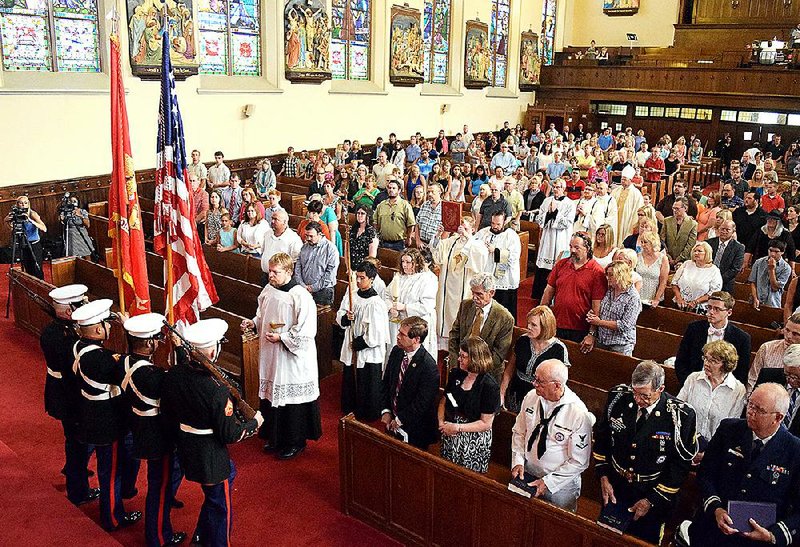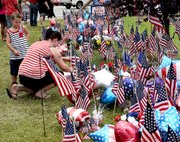NASHVILLE, Tenn. -- Gov. Bill Haslam has called for a review of security policies and procedures at National Guard armories and other military installations in Tennessee after a shooting rampage in Chattanooga that killed four Marines and a sailor.
The governor's office said in a statement Sunday that Haslam has also directed Maj. Gen. Max Haston, Tennessee's adjutant general, to review current Guard personnel who are authorized to be armed while performing their duties and "identify and arm additional Guardsmen where necessary to protect themselves, citizens, and Guard facilities."
"We don't want to leave our folks out there as targets when we've had such a horrible event happen just three days ago," Haslam told NBC's Meet the Press on Sunday.
On Thursday, Muhammad Youssef Abdulazeez opened fire at a military recruiting office and a Navy-Marine operations center a few miles apart. The Marines and sailor were killed at the operations center. Authorities said the 24-year-old Kuwait-born Abdulazeez was killed in a shootout with Chattanooga police. The correct spelling of the gunman's name was still in dispute, with federal officials and records giving at least four variations.
Since the shooting, governors in at least a half-dozen states ordered National Guardsmen to be armed, and Florida Gov. Rick Scott moved his state's Guard recruiters from storefronts in urban areas to armories.
Haslam has asked Haston to examine the security of Guard storefront recruiting centers and work with the U.S. Department of Defense to pursue any available opportunities to enhance the safety of those operations within current federal law and regulations.
The governor also wants the Tennessee Department of Safety and Homeland Security to assess the process for issuing handgun carry permits to trained members of the military and to look for ways to streamline it.
Currently, members of the military may forgo taking a state training course with possession of a military identification and documentation of handgun training through their service. However, in light of the Chattanooga shootings, Haslam has asked that alternatives be considered to make the process quicker and easier for military personnel to obtain permits.
Tennessee House Majority Leader Gerald McCormick, an Army veteran of the first Persian Gulf conflict, said he hopes something can be done to "make sure that these folks are able to protect themselves."
"If some sort of federal regulation makes it impossible to get them armed immediately, we need to do whatever we can through state law," said the Chattanooga Republican, who lived in the same neighborhood as Abdulazeez, even though their paths never crossed.
Counterterrorism investigators, meanwhile, continued to interview acquaintances of Abdulazeez and delve into his months-long visit to Jordan last year, looking for clues to who or what might have influenced him and set off the bloodshed.
His family said in a statement issued Saturday through a lawyer that Abdulazeez had suffered from depression for many years and "was not the son we knew and loved."
"It grieves us beyond belief to know that his pain found its expression in this heinous act of violence," the statement said.
A family spokesman said Sunday that the gunman suffered from depression since his early teen years and also fought drug and alcohol abuse, spending time in Jordan last year to help him clean himself up.
The representative, who spoke on condition of anonymity to avoid unwanted publicity, said relatives of Abdulazeez believe those personal struggles are at the heart of last week's killings.
"They do not know of anything else to explain it," said the representative.
The claim fits a pattern of behavior by Abdulazeez that includes a drunken-driving arrest earlier this year and the loss of a job over a failed drug test.
A year after graduating from college with an engineering degree, Abdulazeez lost a job at a nuclear power plant in Ohio in May 2013 because of what a federal official described as a failed drug test.
Abdulazeez had spent several months in Jordan last year under a mutual agreement with his parents to help him get away from drugs, alcohol and a group of friends who relatives considered a bad influence, the spokesman said.
After returning from his time overseas, Abdulazeez was arrested on a charge of driving under the influence in the pre-dawn hours on April 20. A police report said he told a Chattanooga officer he was with friends who had been smoking marijuana. The report said Abdulazeez, who had white powder on his nose when he was stopped, told the officer he also had sniffed powdered caffeine.
Abdulazeez was first treated by a child psychiatrist for depression when he was 12 or 13 years old, said the family representative.
"He was medicated like many children are. Through high school and college he did a better job some times than others staying with it," said the spokesman.
Several years ago, relatives tried to have Abdulazeez admitted to an in-patient program for drug and alcohol abuse but a health insurer refused to approve the expense, said the representative.
FBI spokesman Jason Pack declined comment on whether investigators were pursuing mental health records for Abdulazeez. But FBI Special Agent Ed Reinhold told reporters at the most recent news conference about the case that agents were looking into all aspects of his life and had not yet turned up any connections to Islamic terrorist groups.
There are more than 100 FBI agents in Chattanooga, primarily from the FBI Knoxville field office, trying to piece together Abdulazeez's path to violence. "That's going to take time," one official said. "We may never know, but we are working toward that."
Anger Surfaces
In Chattanooga on Sunday, Paula Proxmire was surrounded by screaming street preachers, angry protesters and unsettled mourners who had just arrived from church.
Her son, Petty Officer 2nd Class Randall Smith, 26, had died Saturday from wounds suffered in the shooting rampage.
Proxmire stood across from the bullet-riddled Armed Forces Recruiting Center, one of two military sites attacked by the gunman last week. She brushed back a strand of sweat-soaked hair and sobbed. Her son had been dead for barely one day. Around her people were screaming.
"I can't believe these people even come here to this country!" one woman yelled. "Why do they come here?"
"Because they want to kill us," another man answered.
The television cameras edged closer to get a tight shot of Proxmire's tears. The agitated crowd, many of them carrying holstered pistols, wanted to know why President Barack Obama's administration and the military weren't doing more to kill Islamist extremists in Iraq, in Syria or wherever they might be. They were furious at a U.S. military policy, enacted during the Clinton administration, that prevents recruiters from carrying firearms while on duty.
"How many more mothers have to go through this before we finally do something about it?" yelled Darrell Gibbs, 55, pastor at Highways and Hedges Ministries. "How many mothers have to suffer like this, having cameras shoved down their throats?"
The attack in Chattanooga, and the raw anger it has provoked, illustrate the increasingly daunting odds that U.S. counterterrorism agencies face in an era marked by surging Islamist propaganda and a proliferation of disparate, self-radicalized, one-off threats.
One-off attacks are incredibly difficult to detect and stop, officials said. The growing signs that Abdulazeez had self-radicalized and acted alone were of little solace to many in Chattanooga, who were convinced the government was not doing enough to protect them.
At Carl Poston's family-owned gun shop, a few miles from Abdulazeez's home, demand for concealed-carry classes doubled in the days after the shooting. Shooter's Depot, another gun store on the other side of town, said it had seen a fivefold increase with as many as 100 people a day requesting spots in the gun classes.
"I just can't agree that the best we can do is pray for Chattanooga," Hamilton County Public Defender Steve Smith wrote on his Facebook page. "I think the best we can do is ascertain who our enemies are, whether foreign or domestic, and then kill them. ... This same thing will happen again, likely soon, unless our government can do a better job of identifying our enemies."
Information for this article was contributed by Lucas L. Johnson II, Jay Reeves, Michael Biesecker and Eric Tucker of The Associated Press and by Greg Jaffe, Thomas Gibbons-Neff, Greg Miller and Adam Goldman of The Washington Post.
A Section on 07/20/2015


